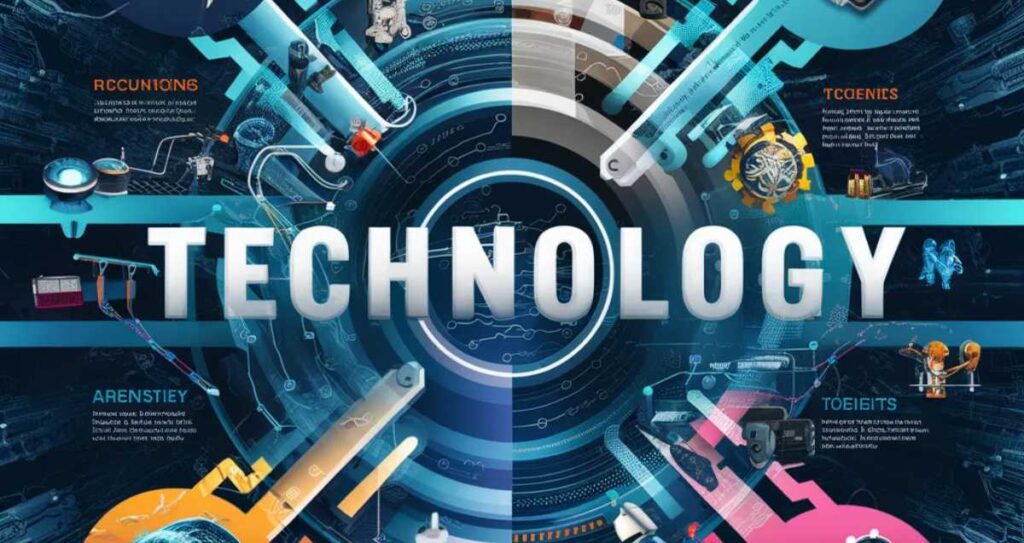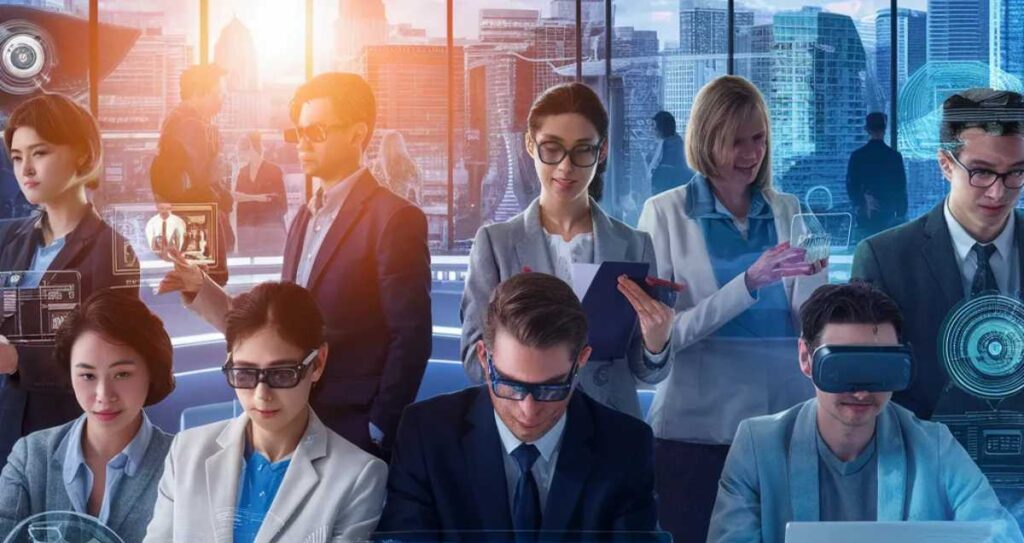Technology refers to the use of scientific knowledge to create tools, systems, and devices that solve problems and improve human life.
Curious about the magic behind your smartphone or the internet? That’s technology! It’s the force transforming our lives and shaping the future.
Technology involves using scientific knowledge to create tools, machines, and systems that solve problems and enhance our lives. It spans everything from everyday gadgets like smartphones to complex systems like the internet, driving progress and innovation across various fields.
What Is Technology? An In-Depth Exploration

The Evolution Of Technology
The history of technology is a tale of human ingenuity and progress. From the simple tools of the Stone Age to the complex digital systems of today, technology has evolved in leaps and bounds. This evolution can be categorized into several distinct eras, each marked by significant technological advancements.
Ancient And Medieval Technology
- Stone Age Tools: Early humans used basic tools made from stone, wood, and bone to hunt, gather, and build shelters.
- Agricultural Revolution: The development of agriculture around 10,000 BCE led to the invention of tools such as irrigation systems, and storage facilities. This revolution allowed humans to settle in one place and form complex societies.
- Classical and Medieval Innovations: The ancient Greeks and Romans made significant advancements in engineering, architecture, and medicine.
The Industrial Revolution
The Industrial Revolution, which began in the late 18th century, marked a turning point in technological development. Key inventions such as the steam engine, spinning jenny, and power loom revolutionized manufacturing and transportation.
The Information Age
The late 20th and early 21st centuries have been defined by the Information Age, characterized by the development of digital technology and the Internet. This era has seen the advent of personal computers, smartphones, and the World Wide Web, fundamentally altering how we access and share information.
The Role Of Technology In Modern Society

Communication
Technology has revolutionized the way we communicate. The advent of the internet and mobile devices has made it possible to connect with anyone, anywhere, at any time. Social media platforms, instant messaging apps, and video conferencing tools have made communication faster, more efficient, and more interactive.
Key Developments in Communication Technology
- Telegraph and Telephone: The invention of the telegraph and telephone in the 19th century enabled long-distance communication for the first time.
- Internet and Email: The development of the internet and email in the late 20th century revolutionized communication by allowing instant exchange of information across the globe.
- Social Media: Platforms like Facebook, Twitter, and Instagram have transformed how we share information and interact with each other.
Healthcare
In the field of healthcare, technology has led to significant improvements in diagnosis, treatment, and patient care. Medical technology includes a wide range of tools and devices, from MRI machines and surgical robots to wearable health monitors and telemedicine platforms.
Major Advances In Medical Technology
- Diagnostic Imaging: Technologies like MRI, CT scans, and X-rays have improved our ability to diagnose and treat diseases.
- Surgical Technology: Robotic surgery and minimally invasive techniques have reduced recovery times and improved outcomes for patients.
- Telemedicine: Remote consultation and monitoring have made healthcare more accessible, especially in remote or underserved areas.
Education
Technology has transformed education by providing new tools for teaching and learning. E-learning platforms, digital textbooks, and interactive whiteboards have made education more engaging and accessible.
Transformative Educational Technologies
- E-Learning Platforms: Websites like Khan Academy, Coursera, and edX offer online courses and educational resources.
- Digital Textbooks: E-books and online resources provide students with up-to-date information and interactive learning experiences.
- Interactive Learning Tools: Tools like smartboards, virtual reality, and gamification have made learning more engaging and effective.
The Impact Of Technology On Business

Technology has revolutionized the business world, making operations more efficient, enhancing communication, and enabling new business models. From small startups to large corporations, businesses rely on technology to stay competitive and meet the demands of a global market.
Automation and Efficiency
Automation technology, such as robotics and artificial intelligence (AI), has significantly improved efficiency in various industries. Automated systems can perform repetitive tasks faster and with greater accuracy than humans, reducing costs and increasing productivity.
Examples of Automation in Business
- Manufacturing: Robotic assembly lines and automated quality control systems.
- Customer Service: AI-powered chatbots and virtual assistants.
- Supply Chain Management: Automated inventory tracking and logistics.
Digital Transformation
Digital transformation involves integrating digital technology into all areas of a business, fundamentally changing how it operates and delivers value to customers. This includes adopting cloud computing, big data analytics, and digital marketing strategies.
Key Components of Digital Transformation
- Cloud Computing: Enables scalable, on-demand access to computing resources.
- Big Data Analytics: Provides insights into customer behavior and business performance.
- Digital Marketing: Utilizes online platforms to reach and engage customers.
The Future Of Technology

As we look to the future, technology continues to advance at an unprecedented pace. Emerging technologies such as artificial intelligence, blockchain, and quantum computing hold the potential to transform our world in ways we can only imagine.
Artificial Intelligence (AI)
AI involves creating machines that can learn, reason, and make decisions. AI applications range from simple chatbots to complex systems that can diagnose diseases, drive cars, and even create art.
Potential Applications of AI
- Healthcare: Personalized medicine and predictive diagnostics.
- Transportation: Autonomous vehicles and smart traffic management.
- Finance: Fraud detection and algorithmic trading.
Blockchain
Blockchain is a decentralized ledger technology that provides a secure and transparent way to record transactions. It has the potential to revolutionize industries such as finance, supply chain, and healthcare by providing greater transparency and security.
Potential Uses of Blockchain
- Cryptocurrencies: Secure, decentralized digital currencies like Bitcoin and Ethereum.
- Supply Chain Management: Transparent tracking of goods from production to delivery.
- Smart Contracts: Self-executing contracts with the terms of the agreement directly written into code.
Quantum Computing
Quantum computing uses the strange rules of quantum mechanics to handle information differently from regular computers.
Read this blog: What Is Information Technology?
Potential Impact of Quantum Computing
- Cryptography: Breaking traditional encryption methods and developing new, secure protocols.
- Drug Discovery: Simulating molecular structures and interactions to develop new medicines.
- Optimization: Solving complex optimization problems in logistics, finance, and other fields.
Case Studies
Case Study 1: The Impact Of Ai In Healthcare
- Background: A leading hospital implemented an AI-powered diagnostic tool to assist radiologists in detecting early signs of cancer in medical images.
- Implementation: The AI system was trained on thousands of medical images to recognize patterns indicative of cancer. Radiologists used the tool to review images and identify potential issues.
- Results: The AI tool improved diagnostic accuracy by 15%, reduced the time needed for analysis, and allowed radiologists to focus on more complex cases. Patients received faster and more accurate diagnoses, leading to earlier treatment and better outcomes.
Case Study 2: Blockchain In Supply Chain Management
- Background: A multinational food company sought to improve transparency and traceability in its supply chain to enhance food safety and consumer trust.
- Implementation: The company adopted a blockchain-based platform to track the journey of products from farm to table. Each transaction was recorded on the blockchain, providing a transparent and immutable record.
- Results: The blockchain system reduced the time needed to trace the source of contamination from days to minutes. It also increased consumer confidence by providing verifiable information about the origin and journey of products.
Case Study 3: Quantum Computing In Drug Discovery
- Background: A pharmaceutical company partnered with a quantum computing firm to accelerate the discovery of new drugs.
- Implementation: The quantum computing firm used its quantum processors to simulate molecular interactions and identify potential drug candidates. Traditional computing methods were unable to handle the complexity of these simulations.
- Results: The partnership led to the discovery of several promising compounds, significantly reducing the time and cost of the drug discovery process. The company was able to bring new treatments to market faster, benefiting patients and shareholders alike.
FAQ’s
Who first defined technology?
The term “technology” was first defined by Jacob Bigelow in the early 19th century, focusing on the practical application of scientific knowledge.
What is modern technology?
Modern technology refers to the current advanced tools and systems, including computers, the internet, smartphones, and AI, that make daily tasks easier and more efficient.
Which one is the best technology?
There is no single “best” technology; it depends on the context. For communication, smartphones might be best; for data processing, supercomputers excel.
What is technology and an example?
Technology is the application of scientific knowledge for practical purposes. An example is the Internet, which enables global communication and information sharing.
Who is the father of technology?
There is no single father of technology, but notable contributors include Thomas Edison and Nikola Tesla for their groundbreaking inventions.
Which technology is first?
The first technology is often considered to be stone tools used by early humans for hunting and building.
Who owns the first technology?
The concept of ownership doesn’t apply to early technologies like stone tools, which were developed collectively by early human societies.
Conclusion
Technology is a dynamic and ever-evolving field that touches every aspect of our lives. From ancient tools to modern AI systems, technological advancements have driven human progress and improved our quality of life.
As we continue to innovate, the future promises even greater possibilities. Whether through enhancing communication, revolutionizing healthcare, or transforming business operations, technology will undoubtedly continue to shape our world in profound ways.
Understanding what technology is and how it impacts various sectors is crucial for navigating the complexities of the modern world. By embracing and harnessing these advancements, we can create a more connected, efficient, and prosperous future for all.
David Mark is a tech and science enthusiast and the writer behind TechNsparks. With a passion for innovation and discovery, David explores the latest advancements in technology and scientific research. His articles provide insightful analysis and engaging commentary, helping readers stay informed about cutting-edge developments. Through TechNsparks, David aims to make complex tech and science topics accessible and exciting for everyone.
